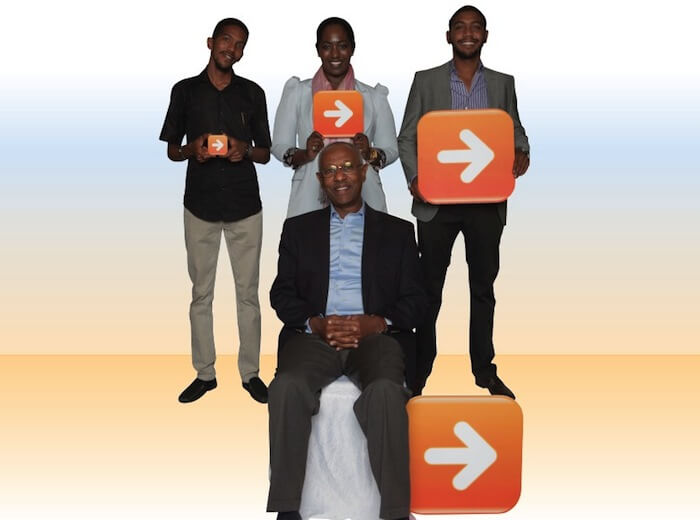Amin Elnefeidi, President, Elnefeidi Group, 2nd generation
Wafa Elnefeidi, Graduate from Towson University, 3rd generation, currently employed outside the group in the field of marketing at Bank of Khartoum in accordance with the family protocol (two years external experience required before joining the family business)
Hussein Elnefeidi, Board Member and General Manager of Seven Rent-A-Car, Elnefeidi Group, 3rd generation
Musab Elnefeidi, Graduate from Liverpool University as Mechanical Engineer, 3rd generation, currently employed outside the group at Kenana Sugar Company
The Elnefeidi Group is one of Sudan’s most prominent family businesses. The late Bashir Elnefeidi, founder of the Elnefeidi Group, started to work with his two brothers in 1934 in a small retail shop, which they grew into wholesale trade. This partnership continued until 1974 when Bashir started to focus his activities on transportation. The brothers expanded the business into other sectors such as agriculture, the oil industry and property development. The family’s investment activities kept on growing under the leadership of Bashir and expanded into the largest transport companies in Sudan and excelled in Chad, Ethiopia and the horn of Africa. Over the years, the Elnefeidi Group diversified into industry, trading and other services. Tharawat magazine met with Amin, Wafa, Hussein and Musab Elnefeidi and witnessed an insightful dialogue on values, the next generation and the future of the family firm.
What are the chief character traits of the Elnefeidi family?
Hussein: I think we are patriotic and humble.
Musab: I would say we are a very tightly knit family.
Wafa: I think we are humanitarian, in sync, and put great emphasis on values and traditions.
Chris: The Elnefeidi family really embraces people and involves you into the family. They are known for that and also for their social responsibility. The second generation has really taken what the late founder established to the next level and expanded the business beyond the field of transportation. The family is always extremely particular about values and ethics.
What are the core values that the Elnefeidi group stands for?
Amin: We grew up in an environment in which we care about what our investment add to the community. We want to instill this in our third generation like my father did with us.
Musab: I think to our family it is important to be seen for the values we stand for, which are clearly aligned with the needs of the community and should benefit all stakeholders.
What would you like the business to stand for in the future?
Hussein: We want to develop the country. We always look at how our investments are going to help the community. I guess that is what I meant by us being a patriotic family.
Amin: Yes, we always think about how our businesses can add to the community. Recently we have been concentrating more on agriculture. We think that this adds not only to Sudan but to the whole region. We are also getting interested in green energy. These are the areas that we want to focus on.
What do you think are the three main characteristics that a family member needs to be successful?
Wafa: Use your individuality but at the same time stay in sync with everyone. If you lose your individuality you lose what you can bring to the business. Another point is open communication; communicate clearly what your vision is. For me the most important thing is not to get lost in problems but to maintain what makes you unique. Thirdly, don’t lose sight of what the vision of the company is and how it was run by the first and the second generation.
Musab: I also think that being on good terms with all family members is important, as well as to be well educated and self-motivated.
Hussein: In addition to what I said earlier I think that ethics, integrity, being hard-working, down-to-earth, and understanding is fundamental.
Amin: I think commitment and being open to say what you believe in is crucial. But at the end of the day you have to be flexible and align yourself with the family’s needs.
Chris: The Elnefeidi family does not take a decision unless there is full agreement. Decisions are not finalised unless the family has fully discussed matters and listened to all perspectives. They never give up the belief in this family. Family comes first, even before the business.
What do you think the next generation should bring to the family business?
Hussein: The next generation should come up with new ideas that are good for the company and that the family can benefit from. They should maintain the values of the business while trying to grow it.
Wafa: I would say that the next generation needs to keep the momentum going. Our third generation includes members from aged 1 to 36 years. We like to divide it into generation 3A and 3B and 3C. Hussein, Musab and myself are the generation 3A and we want to keep the momentum so generation 3C can still benefit and be exposed to the same values the second generation has transferred to us.
Amin: I believe the next generation should think of how they can develop the family’s investment and make it more advanced and more beneficial to the community. This should come before implementing new ideas. New ideas are good because improvements always open new horizons. When we added new lines to the business we didn’t neglect the existing core activities and we always tried to improve it. That this is what we would like to see the third generation doing. We developed the family business from a company that depends on owner’s management into a corporate structure. We need the next generation to reinforce this. This is why an outside experience is very important for young members before they join us because we need them to bring in new ideas. This cannot be done unless someone has the chance to be exposed to the outside world, experience which they can then transfer to the family values.
Does the role of the parent generation change when the young family members join the business?
Amin: It should! We are expecting their ability to take over responsibility to increase day by day. The next generation should relieve the parent generation from a lot of the duties and the role of the parent generation should be more about directing and planning rather than day-to-day work. This is our hope.
Chris: We have successfully integrated several members from the third generation so far. Now there is even a detailed process in place to take care of the next generation joining the business and the responsibilities that should be appointed to them.
What do you think the measures that could be put in place in order to ensure that no misunderstandings can occur?
Amin: The best measure is good communication. We are trying to set a good example for the next generation. We try to open a dialogue and to set rules for the family like the family protocol, and to be fair in judgment but it’s not an easy thing to do.
Wafa: Sometimes I wish there was a magic dust that you could use to trade bodies with someone else for a day in order to understand other family members’ perspective. Communication is hard sometimes. I suggest finding common ground between different generations and using that as a stepping-stone to get over issues that may come up later.
Musab: It’s the way that we were raised that makes the big difference; we grew up seeing how close our uncles were to each other. It helped us with our siblings and cousins. We all live close to each other and see each other everyday, which we love.
Wafa: We were raised as siblings, not as cousins. Most of the time our cousins are also our best friends. We spend a lot of time together even with the extended family, which is good for the business as well.
Hussein: We want to preserve what our ancestors left us and just carry it on. I think we trust each other a lot. It is this trust that makes us succeed.
Tharawat Magazine, Issue 15, 2012

